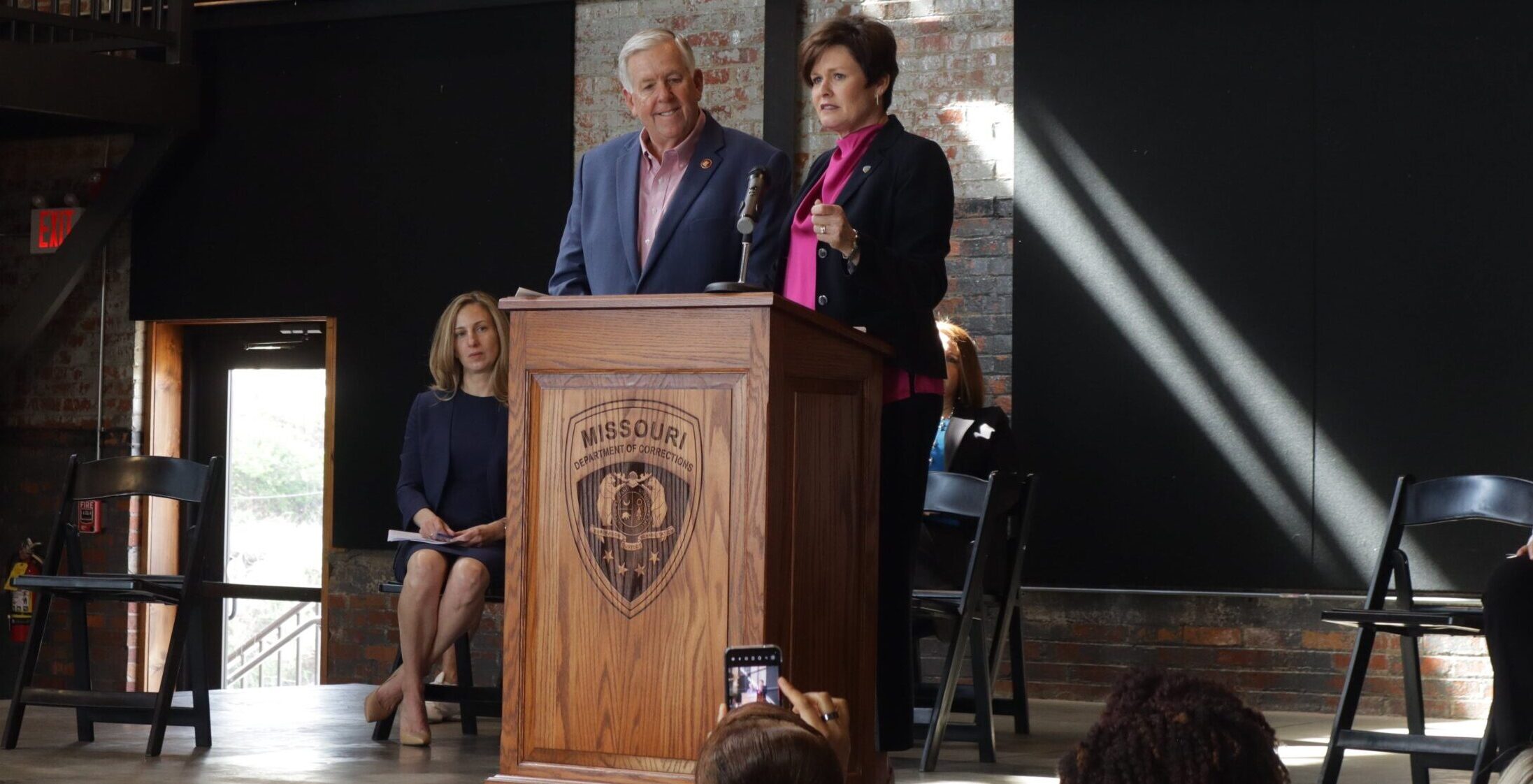
Missouri Ramps Up Efforts to Improve Reintegration Success through Reentry 2030: Update One Year Later
In April 2023, Missouri became the first state in the country to join Reentry 2030, an exciting national initiative led by The Council of State Governments (CSG) Justice Center, in partnership with JustLeadershipUSA and the Correctional Leaders Association, and supported by the Bureau of Justice Assistance, a component of the U.S. Department of Justice’s Office of Justice Programs. Reentry 2030 is focused on scaling up what works in reentry with the goal of successful reintegration outcomes for every person leaving incarceration and those on supervision.
Under the leadership of Missouri Governor Mike Parson and former Department of Corrections Director Anne Precythe, Missouri committed to bold goals to improve reentry outcomes by 2030:
- 100 percent of people who are incarcerated and need career services receive them.
- 85 percent of people who are incarcerated are employed within 30 days of release.
- 80 percent of formerly incarcerated people maintain employment for at least 9 months after release.
Since the official launch, the Missouri Department of Corrections has been making significant strides toward achieving the state’s Reentry 2030 goals by focusing on providing coordinated reentry supports across state agencies, addressing barriers to employment and reintegration, and increasing employment opportunities.
Coordinated Reentry Support by State Agencies
Reentry is an issue that spans multiple agencies. People returning to communities need varying types and degrees of support to achieve successful reentry. As such, it’s critical to understand that a single agency cannot do it all. Providing effective housing, treatment, transportation, health care, employment, family services, and more requires careful coordination and collaboration across multiple systems.
To improve this coordination, ensure efficiency, and leverage resources, Missouri established a State Advisory Team, consisting of leadership from 12 state departments. Since April 2023, the State Advisory Team has met six times to develop a state plan to achieve Reentry 2030 goals.
During these meetings, members have engaged in level-setting conversations, learned more about national best practices in reentry, and even participated in a reentry simulation event to better understand the barriers and challenges experienced by people going through the reentry process. Having state partners who are committed to this mission has allowed Missouri to move forward swiftly with its Reentry 2030 goals.
In addition to building collaboration at the state level, Missouri also established six Regional Reentry Teams, consisting of state agency employees and local community partners, to assess the unique needs and challenges across the state’s geographic regions, identify gaps in services and supports, and implement responses to improve local reentry success.
Missouri is also coordinating and strengthening resources directly on the ground through reentry centers, which provide comprehensive support for Missourians. By the end of 2023, reentry centers were up and running in 10 Missouri Department of Corrections facilities, and the state plans to establish reentry centers in the remaining nine correctional centers by this June.
These reentry centers have dedicated spaces and specialized reentry staff to help people prepare for their release, including providing support to obtain vital documents, developing housing and health care plans, building employability skills, and helping find employment.
Removing Barriers to Employment
Missouri’s Reentry 2030 goals emphasize a human-centered approach to employment, ensuring that people are well prepared to join the workforce, are matched to employment quickly, and maintain their jobs over time.
Currently, a major barrier to employment for people returning from incarceration is difficulty obtaining the necessary personal identification. To address this challenge, Missouri Department of Corrections, in partnership with the Missouri Department of Health and Senior Services, allocated resources to increase people’s ability to access their birth certificates before release.
Additionally, through a collaboration with the Missouri Department of Public Safety, Missouri residents can now take the written driver’s license examination prior to their release from a facility. As part of its Reentry 2030 plan and work with the CSG Justice Center, Missouri will explore additional opportunities to further mitigate barriers to employment.
Increasing Employment Opportunities
The primary focus of Missouri’s Reentry 2030 efforts is to significantly increase the number of people who obtain and maintain employment after release. To support this goal, the Missouri Office of Administration is developing the Missouri Second Chance Hiring Portal, which will provide information to returning Missourians on employment opportunities and resources to promote successful workforce reintegration.
Additionally, the Missouri Department of Higher Education and Workforce Development, which provides pre- and post-release employment services, is expanding its partnership with the Department of Corrections because of Reentry 2030’s explicit focus on economic mobility.
And in late March 2024, the Missouri Department of Corrections hosted a Second Chance Employer Summit, bringing together state leaders, leading employers, and advocates to make the case for hiring formerly incarcerated people and share information and best practices for navigating human resources challenges.
Next Steps for Missouri
While there have been many accomplishments in the past year, this work is just the beginning. In the coming months, the Missouri Department of Corrections will work with the CSG Justice Center to further identify opportunities to strengthen employment programs, mitigate barriers to employment, and ensure that employment strategies are aligned with Missouri’s workforce demands and areas of economic growth.
At the same time, Missouri is also deepening its commitment to its Reentry 2030 goals with targeted investments in its FY24 state plan.
More about Reentry 2030
Reentry 2030 is a national initiative that aims to dramatically improve reentry success for people exiting prison and those under supervision. For more information visit www.reentry2030.org.
ABOUT THE AUTHOR

Governors emphasized a wide range of criminal justice and behavioral health initiatives in this year’s state-of-the-state addresses. From…
Read MoreCorrections leaders balance the complex priorities of maintaining public safety, operating secure facilities, providing needed care and services…
Read MoreThe CSG Justice Center is pleased to announce 5 new members of its advisory board. Hailing from states…
Read More State of the States: Criminal Justice and Behavioral Health Priorities in 2025
State of the States: Criminal Justice and Behavioral Health Priorities in 2025
Governors emphasized a wide range of criminal justice and behavioral health initiatives…
Read More Apply Now for Resident Analyst Program to Increase Data Analysis Capacity at Departments of Corrections
Apply Now for Resident Analyst Program to Increase Data Analysis Capacity at Departments of Corrections
Corrections leaders balance the complex priorities of maintaining public safety, operating secure…
Read More Five New CSG Justice Center Board Members Look to Strengthen Communities and Improve Public Safety
Five New CSG Justice Center Board Members Look to Strengthen Communities and Improve Public Safety
The CSG Justice Center is pleased to announce 5 new members of…
Read More Removing Barriers to Successful Reentry: Q&A with New CSG Justice Center Advisory Board Member Dr. Ronald F. Day
Removing Barriers to Successful Reentry: Q&A with New CSG Justice Center Advisory Board Member Dr. Ronald F. Day
The CSG Justice Center Advisory Board establishes the policy and project priorities…
Read More Transforming Lives with Access to Needed Mental Health Care: Q&A with New CSG Justice Center Advisory Board Member Dr. Courtney Harvey
Transforming Lives with Access to Needed Mental Health Care: Q&A with New CSG Justice Center Advisory Board Member Dr. Courtney Harvey
The CSG Justice Center Advisory Board establishes the policy and project priorities…
Read More Six States Commit to Improving Statewide Strategies to Address Youth Crime, Violence and Behavioral Health
Six States Commit to Improving Statewide Strategies to Address Youth Crime, Violence and Behavioral Health
The Council of State Governments (CSG) Justice Center has launched the Collaborating…
Read More









